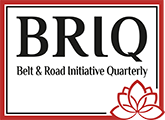EDITORIAL
“Belt” and “Road”: The combination of these concepts, with a deeper connotation than their individual meaning alone, is used to describe the 21st century’s greatest collaboration initiative. The Belt represents “economic corridors”, and the Road represents land routes, railways, and sea routes. Therefore, “Belt and Road” involve the integration of all these corridors and routes. It would not be wrong to claim that the Belt and Road Initiative (BRI) has become one of the two main policies competing with each other in interna-tional relations. BRI promotes peace, cooperation, and shared development against the imperialist policy that increases inter-state conflicts and provokes war.
In the present era, the USA, has been engaging in provocations and conspiracies in every strategic point of the sea and waterways, especially in the Eastern Mediterranean and the South China Sea. US attempts at undermining Turkey’s rights and interests in the eastern Mediterranean does not only concern Turkey, but they also target the interests of China, Russia, and Iran, directly or indirectly. Similarly, US at-tempts at undermining China’s sovereignty rights in the South China Sea are related not only to the interests and rights of China, but also to the interests of Turkey, Russia, and Iran. A similar situation goes for US attempts at confining Iran to the Persian Gulf through sanctions and military threats. Developing countries, suffering from problems created by Atlanticist globalization, must find common solutions to the common threat. In this connection, BRI has already made significant progress in building solid cooperation between Asia, Europe, and Africa. Significant collaborations over BRI have been established not only between China and neighboring countries in the region, but also among several countries across Africa and Europe. Among these, the most important one is the memorandum of understanding signed between China and Italy in March 2019. As a result, Italy has become the first major European country and G7 member that joined BRI.
As the consequences of the COVID-19 pandemic demonstrate, Atlanticist globalization and the so-cioeconomic implications of neoliberalism pose a great threat to the present as well as the future of hu-manity. Atlanticist globalization –contrary to its own claims– constitutes the major obstacle to free trade, development, and peace. Another important point to be noted here is that this situation is not only valid for developing countries, but also for all other countries in the world.
US sanctions against Turkey, China, Russia, and Iran undermine the interests of Europe, as well. For this reason, the gap between the USA and Europe is becoming larger in terms of the policies to be pursued in world affairs. This situation creates favorable conditions for the developing world to resist US pressures. The expansion of BRI by engaging Europe will help to buffer the aggressive policies of the USA.
Moreover, Turkey’s resolution to protect its own rights and interests in the Eastern Mediterranean and Cyprus against US provocations directly contributes to the advancement of BRI. With its role as a strategic bridge between continents, Turkey’s active participation is crucial for the construction of the West Asian feet of BRI. This being said, the positive effect of Turkey’s participation is not limited to this role alone. Turkey’s participation would also disrupt plans for restraining BRI within the borders of Asia.
In this context, partnership with China and Russia is of strategic importance for Turkey, because China and Russia have both technology and experience in producing energy resources in the Black Sea and East-ern Mediterranean Sea.
In the final analysis, one could argue that the “21st Century Maritime Silk Road” constitutes the most important component of BRI. The focus of maritime collaboration under BRI is on jointly building a safe and highly efficient transport corridor at ports along the Belt and Road line. Sovereignty on the seas is important for energy resources basins as well as for the use of resources within the sea and the sea bottom. Another factor as important as this one is the fact that up to 90% of the world’s trade is conducted through seaways. Controlling the seas and the waterways have gained much more importance today than in the previous ages.
FİKRET AKFIRAT
Editor-in-Chief
